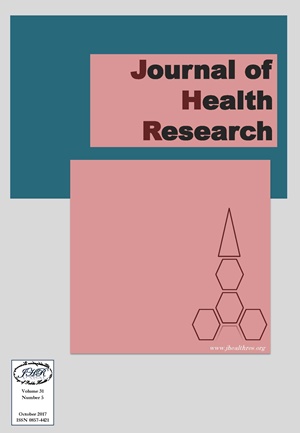Factors Associated with Open Burning Behaviors among Thai and Hill Tribe Farmers in Northern Thailand
Keywords:
Open burning, Farmers, Hill tribe, Environmental health literacy, ThailandAbstract
Background: Air pollution is a major public health problem. In 2016, 936,000 deaths were attributed to ambient air pollution in Southeast Asia. For over a decade, it has been associated with several health problems to residents of northern Thailand. The study aimed to investigate the factors associated with open burning behavior among Thai and hill tribe famers in northern Thailand.
Methods: A cross-sectional study design was applied to elicit information from the participants by a validated questionnaire using the face-to-face method. The study was conducted in the Mae Fah Luang and Muang District, Chiang Rai Thailand. A logistic regression model was used for determining the association between variables at alpha level=0.05.
Results: A total of 354 participants were recruited into the study, 177 each from Mueang and Mae Fah Luang Districts Chiang Rai province. One hundred and seventy-seven were Thais while the same number were hill tribe farmers. The mean age of the respondents was 51.3. About 58.5% were males, 84.5% were married, 69.2% had received formal education, 78.2% were Buddhists, and the average monthly income was 5,977.7 THB. Two factors were found to be significantly associated with open burning behavior after controlling for all possible compounding factors: those within the low environmental health knowledge group had a greater likelihood of engaging in open burning than those within the high level of environmental health knowledge group (OR= 98.39, 95%CI= 22.02-439.54), and the lesser the land cultivated, the lower the likelihood of open burning (ORadj =0.01, 95% CI 0.00 – 0.04).
Conclusion: Low levels of environmental health knowledge, an aspect of environmental health literacy and size of cultivated land were found to be the major factors associated with open burning behavior in Chiang Rai Province, Thailand. There is a need to develop strategic intervention policies in order to enhance the environmental health literacy level of farmers in the area and by extension, reduce the rate of open burning.







